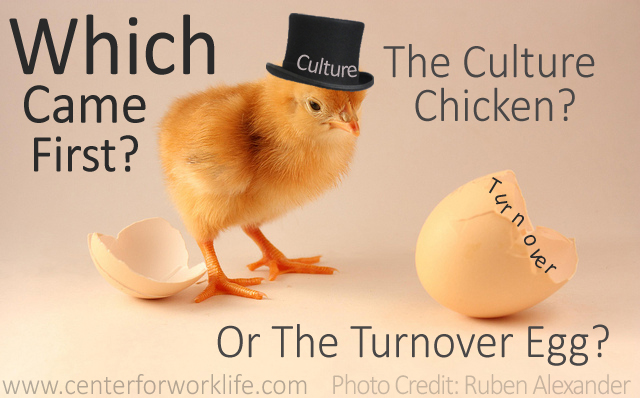Which came first: the organization’s poor culture (the chicken) or high turnover (the egg)? Realistically, the answer to that question is much less important than the solution to breaking the cycle. Don’t worry, this discussion isn’t about exterminating chickens, but rather exterminating negativity, lack of unity and unnecessary turnover.
Employer’s who spend years dealing with high turnover and lack of loyalty scratch their heads, wondering what has gone wrong. John Kotter, a Forbes contributor, wrote that there are two main reasons culture change efforts fail in organizations. He says that people don’t understand what culture is and why it is important.
So, What Is Culture?
Culture consists of group norms of behavior and the underlying shared values that help keep those norms in place (a definition from Kotter himself).
Why Is Corporate Culture Important?
The importance of culture in organizations ranges from boosting employee morale, improving productivity and motivating staff to effectively reaching your customers. As described by David Hassell in Huffington Post’s Busting the Myth of Company Culture “culture is a direct investment into your company’s bottom line.”
Negative corporate culture starts with poor hiring, which leads to ineffective talent management, and doesn’t end there. Poor morale, lack of productivity, and disengagement could cost organizations lots of lost dollars. The good news is culture change is doable. Consider the pointers below in creating and maintaining a strong corporate culture.
Employee and Employer Cultural Alignment
For Employers and Leaders:
- Clearly define and communicate the company mission
- Be transparent about practices and methodologies in all strategic decisions
- Understand and communicate your culture to employees through branding, actions, and communications
- Select employees carefully by assessing their behavioral qualities and goals
- Create a balanced fun and professional work environment
- Provide growth plans for leaders
- Value employee feedback
- Remove obstacles keeping your employees from becoming confident
- Learn about what motivates each employee
- Invest in employee’s skills
- Utilize communication training, leadership coaching and team building resources
- Make sure your organization understands employee’s work life balance needs
- Enforce accountability in your culture, or it won’t last
For Employees and Job Seekers:
- Take time to understand yourself well and know your values
- Search for employer’s whose values most resonate with your own
- Don’t apply to work for organizations if you don’t agree with their mission
- Honestly discuss your goals with potential or current employers
- Population’s are sometimes diverse within companies, so make an effort to connect with people to whom you can relate
- Spend time to understand how your goals align or don’t align with those of the company
- Evaluate the organization’s work life balance policies
- Review glassdoor and other sources to see employee reviews of the business
- Evaluate the pros and cons of working at the organization
- Determine if you agree with the organization’s ethics
- Find out if there is upward mobility and what it looks like
- Know that sometimes you have to give up something to get something
So, quit worrying about the chicken and the egg. And don’t waste time pointing fingers. Move forward with big goals so you can “win the Powerball of awesome culture,” so to speak.






